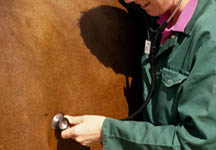Another 50 horses on the premises in Wiltshire where two horses were found to have swamp fever [EIA] are awaiting tests.
A Defra spokesman has confirmed to H&H that the horses are pending an epidemiological investigation.
“The premises remains under restriction, while an epidemiological investigation takes place,” he said.
“This will include looking at whether some or all of the other animals need to be tested and when it would be best to do so bearing in mind incubation periods [for swamp fever].
The spokesman declined to comment on why the 10 horses from Romania and Belgium were imported into the UK, saying it would risk identifying the premises in Wiltshire on which they were found.
But speculation among the horse industry is that the yard belongs to a horse dealer. The horses were certified as having entered the UK for “breeding purposes” but that has been found not to be the case.
Defra discovered the two horses with swamp fever during routine post-import testing. Due to free trade laws, post-import testing can only be carried out on a random basis, and experts are already saying the UK horse industry has been “incredibly lucky” to have found the disease on this occasion.
World Horse Welfare chief executive Roly Owers added his appreciation to Defra for acting so swiftly, but questioned why the discovery was made a month after the horses arrived in the UK — on 22 December.
“Why has it been such a long time and what are they doing here?” he asked, adding that World Horse Welfare has been monitoring the travel of horses from Romania — where EIA is endemic — across Europe for years.
“We have been concerned about practices and highlighted them to Europe and to Defra,” he said. “Under the Tripartite Agreement there is free travel of horses between the UK, Ireland and France so there is no reason why these would have been picked up — the horse industry is lucky this time.”
He added that the practice of buying cheaper horses from Eastern Europe is fraught with danger.



